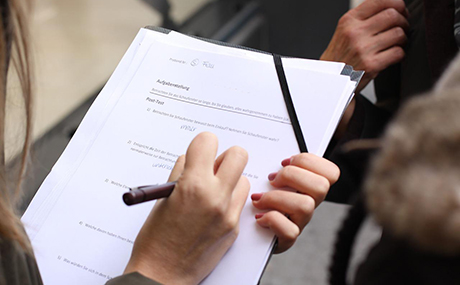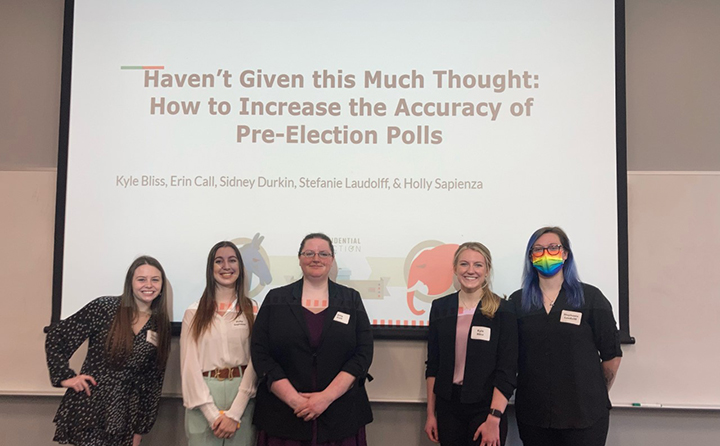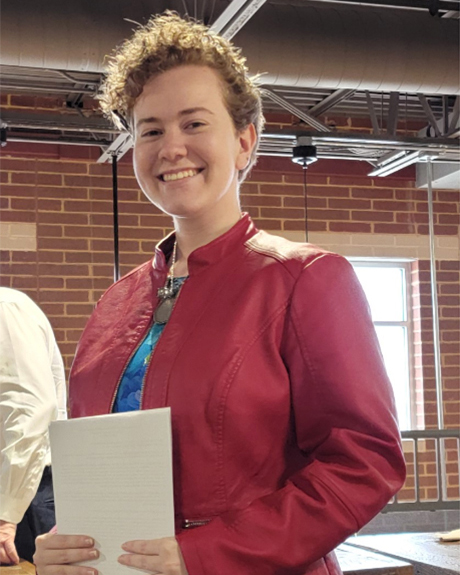 Results of a Baldwin Wallace University research project help to explain the widespread inaccurate margins in "horserace" polling leading up to the 2020 presidential election.
Results of a Baldwin Wallace University research project help to explain the widespread inaccurate margins in "horserace" polling leading up to the 2020 presidential election.
A team of student and faculty researchers tested two theories about why statewide polling accurately identified President Trump as the winner in Ohio but understated the margin of his lead over Joe Biden. Similarly, statewide polling accurately identified Biden as the winner in Michigan, Pennsylvania and Wisconsin but overstated his margins. They also examined the issue of narrower margins in national polls.
The research team found evidence supporting two possible sources of polling error. First, the ambivalent or mixed attitudes undecided voters had toward Trump. Second, strong Trump supporters may have been less likely than other voters to participate in public opinion polls, leaving their voices underrepresented.
BW political science professor Dr. Lauren Copeland and sociology professor Dr. Julie Newcamp organized the Faculty-Student Collaboration (FSC) course to study possible sources of polling error and to identify ways to improve the accuracy of public opinion polls.
 To test the idea of undecided voter ambivalence, the researchers used a statistical software program to analyze pre-election survey data from Baldwin Wallace University's Great Lakes Poll, which the Community Research Institute collected in October 2020. They also dissected 2020 pre-election survey data from the American National Election Studies.
To test the idea of undecided voter ambivalence, the researchers used a statistical software program to analyze pre-election survey data from Baldwin Wallace University's Great Lakes Poll, which the Community Research Institute collected in October 2020. They also dissected 2020 pre-election survey data from the American National Election Studies.
According to Copeland, the research confirmed that undecided voters had mixed attitudes toward Trump and appear to have broken Trump's way on election day.
"Although a supermajority (70%) of undecided voters approved of Trump's handling of the economy, only about one-third (35%) approved of his handling of the pandemic," Copeland explains. "That finding held across both polls. It's possible undecided voters voted for Trump on election day based on pocketbook issues."
 To test the idea that Trump supporters were less likely to share their opinions with pollsters at all, the research team convened a focus group with a large conservative grassroots organization.
To test the idea that Trump supporters were less likely to share their opinions with pollsters at all, the research team convened a focus group with a large conservative grassroots organization.
Students designed the qualitative focus group instrument and Sarah Giddings '23, president of BW's College Republicans, facilitated the session.
Preliminary findings suggest that strong Trump supporters may participate in public opinion polls at lower rates.
"These voters may be less likely to participate because they do not trust the organizations that conduct public opinion polls, including academic research centers," said Giddings. "Instead, GOP voters believe that poll results are released to suppress the conservative vote, as well as to change people's opinions, not to accurately measure them."
One focus group participant stated, "People have gotten to the point where not only you don't trust practically any media, no matter what it is. I hate to say this, but we don't trust our medical field. We don't trust our government; we don't trust anyone or anything at all."
Copeland says the level of mistrust makes it hard to solve the poll participation issue.
"The participants said they would be more likely to participate in polls conducted by students at BW because they would feel that they are helping someone," Copeland explains. "They also said when the polls get it right, trust will follow. But, it's a vicious cycle because polling accuracy can't increase if strong Trump supporters don't participate."
Students presented their preliminary results at BW's annual Ovation Day of Excellence, which featured more than 135 original research and creative projects.